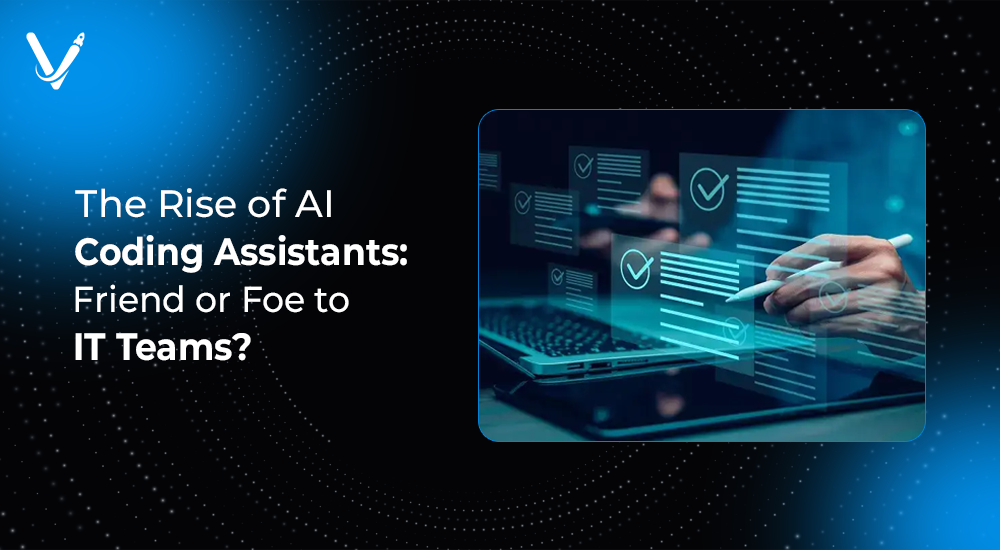The Rise of AI Coding Assistants: Friend or Foe to IT Teams?


- Jul 8, 2025



The buzz around AI coding assistants has moved beyond hype. These AI-powered tools are stepping into developer workflows, generating boilerplate code, suggesting entire functions, refactoring legacy systems, and even reviewing pull requests automatically. But are they truly teammates or just clever productivity hacks?
This article explores the rise of AI coding assistants, what they mean for IT teams, and how leaders can use these tools wisely without sacrificing code quality or team autonomy. By unpacking real-world examples, case studies, and actionable insights, we will clarify if AI coding assistants are a friend or foe for modern IT teams aiming to deliver faster while keeping technical debt under control.
Before labeling them as helpers or threats, it’s vital to understand what AI coding assistants truly are.
What is AI code?
AI code refers to software-generated or software-suggested code created by machine learning models, typically large language models (LLMs), trained on vast code repositories. Unlike basic code snippets or auto-complete features, AI-powered coding assistants understand context, variable scopes, and syntax to generate, suggest, and refactor code intelligently.
How AI coding assistants could be game-changers:
Popular AI-assisted coding tools include GitHub Copilot, Tabnine, Amazon CodeWhisperer, and open-source models like Code Llama, each with unique strengths depending on your environment.
Years ago, code suggestion meant auto-completing function names. Today’s AI programming assistants can generate entire REST APIs or microservices based on a prompt. This evolution began with advancements in LLM frameworks like GPT-3, Codex, and the rise of transformer-based models capable of understanding complex instructions and code semantics.
The adoption curve was steep:
Now, companies are assessing how AI coding assistants impact long-term maintainability and code security, balancing the productivity gains with potential risks.
Developers spend significant time writing repetitive code. With AI-powered coding assistants, they can:
New developers often struggle to learn code standards. AI software development tools can guide them by suggesting code aligned with company conventions, reducing onboarding time.
Startups and innovation labs leverage AI-assisted coding to quickly prototype MVPs, test new integrations, and pivot with lower costs.
AI can encapsulate best practices, ensuring new developers get high-quality code suggestions even if senior developers are unavailable.
A mid-sized SaaS company integrated GitHub Copilot into their development workflow. Initially skeptical, the team tested it on writing boilerplate code, error handlers, and test cases.
Results within 6 months:
The key takeaway was clear: AI coding assistants amplified the team’s capacity but required structured review processes to ensure quality.
Despite the benefits, AI coding assistants comparison studies highlight areas of concern:
AI suggestions can sometimes:
Some AI tools might:
Teams relying too heavily on AI programming assistants may face:
Using cloud-based AI assistants requires sharing snippets with external servers, raising compliance concerns in sensitive industries like finance and healthcare.
For IT leaders looking to embrace AI-powered coding assistants while avoiding pitfalls:
Establish Clear Guidelines
Set boundaries for AI use: where it can generate code, where human validation is mandatory, and which parts of the system it should never touch (security-critical components).
Implement Human-in-the-Loop Reviews
AI can draft, but humans should review. This ensures quality control and maintains accountability.
Train Teams on AI Collaboration
Help developers understand that AI is a collaborator, not a replacement. Encourage them to analyze, refactor, and learn from suggestions.
Monitor and Audit AI Outputs
Regularly review AI-generated code for patterns that introduce inefficiencies or security issues.
IT teams can adopt AI-assisted coding tools strategically:
The rise of AI-powered coding assistants is unlikely to replace developers but will redefine their roles:
This future aligns with the broader trend of AI software development tools moving into co-pilot roles rather than replacing pilots.
Popular AI coding assistants comparison:
Use AI coding assistants for:
Create a guide detailing:
Track metrics like:
At Vasundhara Infotech, we see AI coding assistants as amplifiers, not replacements. By integrating these tools responsibly, teams can innovate faster, reduce operational bottlenecks, and improve product quality while upskilling their developers to thrive in a rapidly evolving landscape.
We help organizations integrate custom AI development solutions, including AI coding assistants, tailored to their workflows, ensuring alignment with business goals while maintaining security and compliance.
The rise of AI coding assistants represents one of the most exciting advancements in software development. While concerns about code quality, security, and developer dependency are real, these tools, when used strategically, can be powerful allies to IT teams.
By establishing best practices, fostering human-AI collaboration, and maintaining rigorous review processes, IT teams can transform AI coding assistants into indispensable friends that enhance productivity without sacrificing control.
Are you ready to explore how AI coding assistants can empower your IT team? Contact us today to integrate AI into your software development workflows with confidence.
Copyright © 2026 Vasundhara Infotech. All Rights Reserved.